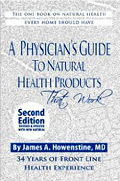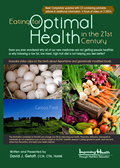By
Dr. Carolyn Dean, MD, ND
October 11, 2009
NewsWithViews.com
There is a new war between the health products industry and the FDA about health claims. The health product industry wants to state on their labels what their products are supposed to do for your health. My concern with health claims began when Archer Midland Daniels (AMD) won a long battle with the FDA to obtain a heart health claim for soy. That was back in 1999 and soy became the food that would save us all from a host of ills and its sales skyrocketed. But ten years later we find that soy may be hurting us, not helping. Ninety percent of the soy in the US is genetically modified and the way soy is processed in this country makes it indigestible and even dangerous.
The health claim for soy is still in place, a decade later, and soy has evolved to health king status. As Mike Adams reports on May 20, 2009 “Virtually all "protein bars" on the market today are made with soy protein. Many infant formula products are also made with soy protein, and thousands of vegetarian products (veggie burgers, veggie cheese, "natural" food bars, etc.) are made with soy protein. That soy protein is almost always described as safe and "natural" by the companies using it. But there's a dirty little secret the soy product industry doesn't want you to know: Much of the "natural" soy protein used in foods today is bathed in a toxic, explosive chemical solvent known as hexane.”
In Asia soy is only used in the fermented state. When reports of soy’s benefits reached America the process of fermentation was quickly dropped. Fermentation has the benefit of removing the toxic components of soy to make is more digestible. Hexane is the US equivalent of that process. However, testing shows “Hexane residues of 21ppm were discovered in soy meal commonly used to produce soy protein for infant formula, protein bars and vegetarian food products.”
Mike Adams warns that “There is no requirement that food companies test their products for hexane residues (including soy-based infant formula). And protein bars that say “made with organic oats and soybeans are required by law to have 70% organic ingredients -- the remaining 30%, however, can legally be hexane extracted." As for the environmental toxicity, “Each year in Illinois, ADM, Cargill, Bunge and other companies release nearly 5 million pounds of hexane into the environment.”
A strong voice against the use of soy is The Weston A Price Foundation. Sally Fallon and Mary Enig have written widely on the subject. They note that soybeans “are produced in factories at high temperatures and pressures and with the help of a variety of chemicals. The soybeans themselves are grown on huge corporate farms, most of which use toxic pesticides and herbicides. And a large percentage of soy foods come from genetically engineered plants. The fact that these products can be labeled "natural" only demonstrates the power and duplicity of soy interests in America.”
On the subject of GMO. According to Jeff Nield writing for treehugger.com, “Soy is one of the big three genetically engineered crops along with corn and canola. Since its introduction to farmers in 1992, 90% of the soy grown in the United States has been bought from Monsanto and comes Roundup Ready.” Roundup Ready means the plants are genetically modified to withstand high amounts of the herbicide called Roundup. Nield continues “After a decade of astronomical growth this could be the first year that farmers start turning away from the GE giant's seeds.” This is because of the high cost for the seeds and herbicide and perhaps there is a shift in the market where people are demanding non-GMO soy.
Fallon and Enig agree with many researchers and authors that soy contains "allergens, mineral blockers, enzyme inhibitors, hormone modifiers and iodine blockers that interfere with normal thyroid function." They also state that the promotion of soy is now on the level of propaganda. They say “Propaganda is ‘the systemic propagation of a given doctrine or of allegations reflecting its views and interests; material disseminated by the advocates of a doctrine.’ The promotion of soy as a miracle food has been both systematic and reflective of the doctrine of the food industry—that imitation foods are good for us and traditional foods are unhealthy. The soy campaign is, in fact, a case study in the use of use of propaganda to promote commercial interests.”
In their report to the Townsend Newsletter Fallon and Enig give a long list of scientific references about the dangers of soy. Perhaps these dangers are not just inherent to soy but also because of the hexane contamination. Their major concern is the widespread use of soy infant formulas and they cite a “Puerto Rican study which found that consumption of soy formula correlated strongly with early maturation in girls.” They also state that “Soy can be implicated as a probable cause in the current epidemic of learning disabilities because it has similar effects in monkeys.”
|
Subscribe to the NewsWithViews Daily News Alerts! |
My advice, as always, is to go back to traditional foods. Be very skeptical about foods that are processed and be skeptical about the considerable hype and marketing behind any ‘new’ food product. Beyond the negative health effects, you’re paying a premium price for overly processed food to support the advertising.
Future Health Now!
If you would like more detailed information on how to change your lifestyle and improve your health, sign up for my free online newsletter that has tips and techniques for getting healthy and staying healthy. Even better, join my Future Health Now! wellness program.*
*Future Health Now! is an inexpensive series of 48 weekly "consulting sessions in print." Every seven days, I guide you step-by-step on how to add natural practices to your daily routine. Daily consistency will undoubtedly give you the best chance at lasting physical and mental health.
Meet The Doctor of the Future: Dr. Dean is a medical doctor, naturopath, herbalist and acupuncturist. She’s authored 18 books including The Yeast Connection and Women’s Health, IBS for Dummies and the Magnesium Miracle. Radio, TV and magazines interview her regularly. She's also the medical director of the Nutritional Magnesium Association. You’re invited to join Dr. Dean’s online wellness program Future Health Now! http://drcarolyndean.com/futurehealthnow plus receive a free subscription to her Doctor of the Future newsletter.
References:
1-
Are
health claims curbing freedom of speech? Sept. 29, 2009
2- "Natural"
Soy Protein Is Bathed in Hexane
3- U.S.
Farmers Planting Less GMO Soy
4- Reply
to Mr. Bill Sardi, published in The Townsend Letter, April 2001
5- Archer
Daniels Midland Produces Soy Products that May Improve Health
� 2009 Dr. Carolyn Dean MD - All Rights Reserved
Sign Up For Free E-Mail Alerts
Meet The Doctor of the Future: Thomas Edison said, “The doctor of the future will give no medicine, but will interest her or his patients in the care of the human frame, in a proper diet, and in the cause and prevention of disease.” Dr. Dean is The Doctor of The Future. She’s a medical doctor, naturopath, herbalist and acupuncturist. She’s authored 18 books including The Yeast Connection and Women’s Health, IBS for Dummies and the Magnesium Miracle. Radio, TV and magazines interview her regularly — including ABC, NBC and CBS. She's also the medical advisor for the Nutritional Magnesium Association. You’re invited to join her online wellness program Future Health Now! plus receive a free subscription to her Doctor of the Future blog.
To
subscribe or find out more go to:
Website:
www.drcarolyndean.com
Follow Dr. Dean on Twitter: http://twitter.com/DrCarolynDean
E-Mail: help@drcarolyndean.com















